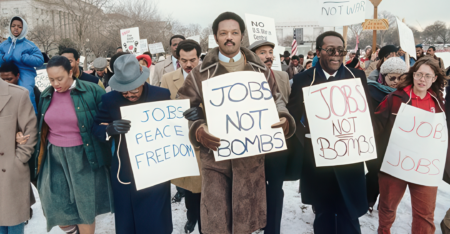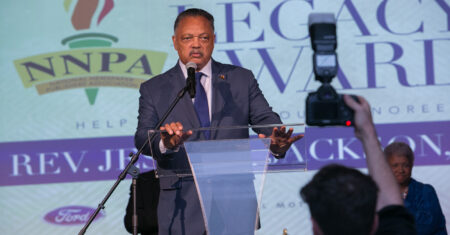By Dedrick Asante-Muhammad is President of the Joint Center for Political and Economic Studies & Eric Morrissette is a Senior Fellow at the Joint Center for Political and Economic Studies and served as Acting National Director of the Minority Business Development Agency (MBDA).
“I have often made the point that to foster the economic status and pride of members of our minority groups, we must seek to involve them more fully in our private enterprise system… To do this, we need to remove commercial obstacles that have too often stood in their way—obstacles such as the unavailability of credit, insurance, and technical assistance.”
Those were the words that gave rise to the first iteration of what would become the Minority Business Development Agency (MBDA)—spoken by Republican President Richard Nixon. More than fifty years later, those words ring hollow as the Trump administration races to dismantle the agency, hollowing out the small staff that remained after earlier rounds of downsizing—just 23 career employees—to none. Today, only two political appointees remain, one of whom also serves as the Deputy Secretary of Labor.
The MBDA is not a bureaucratic relic; it was a rare glimmer of bipartisan progress during the civil rights era and remains the only federal agency devoted to expanding opportunity for entrepreneurs who have historically been locked out of capital markets, contracting networks, and investment pipelines. Its deliberate dismantling is both a moral failure and an economic crisis.
A small staff, a massive mission
At its height, the MBDA oversaw a nationwide network of business centers, technical-assistance hubs, and capital-readiness programs serving tens of thousands of enterprises. The agency is responsible for supporting more than 12 million minority business enterprises (MBEs) across the United States. And “minority” here is broader than many realize—it includes not only businesses owned by people of color but also by members of socially or economically disadvantaged groups such as rural, veteran, and women-led small businesses.
Through a network of more than 130 centers and partners across the U.S. and its territories, MBDA provided hands-on technical assistance to help businesses navigate growth and scale successfully. No free money. No direct loans. Just guidance to help these businesses help themselves.
By any measure, MBDA was delivering results. During Morrissett’s tenure leading the agency, immediately before the start of the Trump administration, MBDA helped businesses secure $3.2 billion in contracts and $1.6 billion in capital, creating and retaining more than 23,000 jobs. Last year also marked the first year of MBDA’s Capital Readiness Program—the largest-ever federal initiative of its kind—designed to help underserved entrepreneurs grow and scale their businesses. In its first full year, the program served more than 6,300 entrepreneurs and helped raise $263 million in capital.
In other words, MBDA evolved into a broad, national platform for growth—one that reaches well beyond race alone. Its clients range from a Black-owned cybersecurity startup in Atlanta to a Latina-led food manufacturer in Texas, a Native American construction cooperative in Oklahoma, a veteran-owned logistics firm in Ohio, and a white Appalachian entrepreneur rebuilding a small-town sawmill with limited access to capital. MBDA’s scope reflects a fundamental truth: opportunity gaps are intersectional. A functional MBDA recognizes that inclusive economic development requires tools that reach across these lines, while still honoring the agency’s original civil-rights mission—to repair the damage of centuries of racially exclusive capitalism.
What we stand to lose
When an agency like MBDA is dismantled, the casualties are not bureaucrats–they are business owners, workers, and America’s competitiveness. Without MBDA, it becomes harder for disadvantaged businesses to access capital, navigate federal and corporate procurement systems, and unlock innovation.
We know empirically that minority-owned and disadvantaged businesses receive less capital and pay more for it. Programs like the Capital Readiness Program were designed precisely to close that gap—helping entrepreneurs get a fairer shot at the financing they need to grow and hire. MBDA’s business and procurement centers also ensure that our public and private contracting pipelines are diverse, making our supply chains more resilient to shocks like the pandemic.
Beyond that, MBDA’s mission aligns with the broader economic imperative of closing America’s opportunity gap—a gap that sidelines an estimated $7.1 trillion in potential economic output, nearly a quarter (23.3%) of U.S. GDP. Activating that untapped potential doesn’t just strengthen minority communities; it strengthens America itself.
Why this matters to Black America—and to the nation
For African American entrepreneurs, MBDA has long been one of the few federal lifelines amid systemic exclusion from wealth creation. Black business ownership remains a powerful tool for asset development. But the erosion of MBDA does not only harm Black business owners—it weakens America’s entire small-business ecosystem. In 2022, the most recent year of available data, Black-owned businesses added $212 billion in revenue to the U.S. economy and paid more than $61 billion in total wages—part of a broader trend of inclusive national growth. Cutting MBDA is not fiscal prudence; it is economic sabotage in a broader dismantling of civil rights and economic scaffolding.
The path forward
We must demand that Congress and the Administration act swiftly to reopen the government and restore MBDA’s staffing, budget, and network of partners supporting businesses around the country. Lawmakers must:
- Restore independent nonpolitical programs and staff to support the socially and economically disadvantaged businesses of this country.
- Guarantee stable funding so the agency cannot be hollowed out each time administrations change, and businesses can be provided some predictability.
- Protect MBDA’s statutory authority to focus on disadvantaged entrepreneurs, including those facing social, geographic, or economic barriers.
- Modernize MBDA’s mission for an AI-driven economy, helping minority and disadvantaged firms adapt to new technologies rather than be displaced by them.
- Reinforce the apolitical nature of MBDA’s work with bipartisan safeguards allowing the work to be unimpeded.
MBDA’s destruction would signal that the federal government no longer feels an obligation to correct the marketplace’s deepest inequities—the very inequities Richard Nixon sought to address when founding the agency. Yet we know the opposite is true. Our economy is strongest when every community can build and own, and when capital flows not just to those who’ve always had it, but to those ready to create something new. Letting MBDA die would betray that promise. Defending and expanding it would affirm that economic opportunity belongs to every American.







